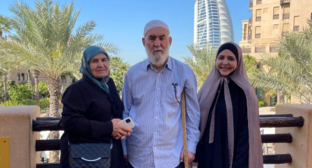
27 April 2020, 16:51
Week in the Caucasus: review of main events of April 20-26, 2020
Increase in the number of coronavirus-infected people in Southern Russia and in the countries of Southern Caucasus; new forms of actions in memory of the victims of the Armenian Genocide in the Ottoman Empire; beginning of Ramadan without collective prayers in Southern Russia, – see the review of these and other events in the Caucasus during the week of April 20-26, 2020, prepared by the "Caucasian Knot".
Increase in number of coronavirus-infected people in Southern Russia and in countries of Southern Caucasus
Over the past week, the number of coronavirus-infected people was still growing in the countries of Southern Caucasus and in the regions of Southern Russia. On April 26, in Georgia, the number of people infected with coronavirus reached 485, in Azerbaijan – 1645, in Armenia – 1746, Abkhazia – 3, and in Nagorno-Karabakh – 8. The coronavirus death toll also grew. Georgia has already registered 6 deaths, Azerbaijan – 21, Armenia – 28, and Abkhazia – 1.
Meanwhile, on April 25, the Georgian authorities announced lifting of restrictions step by step within the period from April 27 to July 6. On April 27, the Azerbaijani authorities plan to open shops and a number of service sector enterprises. In Armenia, where, like in Georgia, the state of emergency has been imposed, the authorities have not yet announced lifting the restrictions.
In Southern Russia, the number of coronavirus-infected people is also still growing: on April 26, their total number reached 5367 (3036 new cases over the week). The COVID-19 death toll also grew significantly, from 38 to 76.
In the regions of Southern Russia, the advanced-readiness regime is still maintained, and the operation of enterprises and the movement of residents are restricted. In Kabardino-Balkaria, restrictive measures were extended until April 30. Instagram users demanded to mitigate the self-isolation regime. Residents of Rostov-on-Don also express their dissatisfaction with the regime of self-isolation. Residents of Kuban complain about receiving fines for violation of the quarantine regime while leaving pharmacies and walking not far from home.
Protest rally against self-isolation regime in Vladikavkaz
On April 20, in Vladikavkaz, opponents of the self-isolation regime demanded the resignation of the government. Law enforcers dispersed the protesters. Vyacheslav Bitarov, the leader of North Ossetia, announced that residents who lost their income because of restrictive measures would receive help from the authorities. According to investigators, 13 law enforcers were injured at a spontaneous rally which gathered about 2000 people. The police detained 69 people. Three protestors were fined, and the court pronounced a decision to arrest 41 participants of the rally.
The protesters claim that the coronavirus infection is not dangerous. The leader of the republic has called the dissemination of such an opinion a criminal act. The main reason for the protest action was the loss of earnings because of informal employment, local residents say. The rally participants transferred their demands into the political sphere and did not succeed in seeking a solution to the socio-economic tension in the region, political analyst Alan Mamiev believes.
New forms of celebration of Circassian Flag Day and actions in memory of victims of Armenian Genocide in Ottoman Empire
On April 25, the spread of the coronavirus infection changed usual events on the celebration of Circassian Flag Day. Circassian activists have posted flags on balconies and exchanged posts with congratulations in social networks. Residents of Kabardino-Balkaria and Adygea have noted that they were celebrating the holiday in self-isolation for the first time. Earlier, the Circassian Flag Day used to be celebrated with concerts, equestrian processions, and motor rallies.
Every year, on April 24, residents of Armenia, Nagorno-Karabakh, and members of the Armenian Diaspora mark the Day of Remembrance of the Victims of the Armenian Genocide in the Ottoman Empire in 1915-1923. This year, a march to the "Tsitsernakaberd" memorial complex in Yerevan was cancelled because of the spread of the coronavirus infection. Residents of Armenia held a virtual rally to pay tribute to the memory of the victims. Users of social networks posted photos with the stories of their ancestors from Armenia.
Beginning of Ramadan without collective prayers in Southern Russia
This year, Ramadan, the holy month for Muslims, began on April 24, and it will end on May 23, before the holiday of Eid al-Fitr. Earlier, in Northern Caucasus, imams have announced that a month may pass without collective prayers because of the spread of the coronavirus infection, but fasting may not be cancelled. According to a survey conducted by the "Caucasian Knot", in Dagestan, Kabardino-Balkaria, Chechnya, Ingushetia, and Adygea, believers met restrictive measures with understanding. Residents of Southern Russia pray at home and hold evening talks in Ramadan within family circles.
Arrest of Pyatigorsk Mayor Lev Travnev
On April 25, Lev Travnev, the former Mayor of Pyatigorsk, was detained in a case on abuse of power related to fraud with land plots. The court took Lev Travnev into custody for two months. Earlier, on April 16, the quarantine regime was imposed in Pyatigorsk in connection with the spread of the coronavirus infection, and City Mayor Andrei Skripnik was dismissed from his post. Lev Travnev replaced him, but six days later he also left the position. Governor Vladimir Vladimirov announced that Lev Travnev had been sent for long-term medical treatment. It should be noted that Lev Travnev was holding the position of the Mayor of Pyatigorsk in the period from 2006 to 2017. Then Andrei Skripnik replaced him on the position of the city mayor.
This article was originally published on the Russian page of 24/7 Internet agency ‘Caucasian Knot’ on April 27, 2020 at 09:10 am MSK. To access the full text of the article, click here.





Комментирование через Кавказский узел